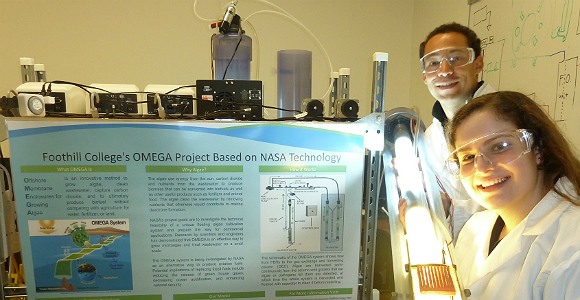
Cole Nielsen-Cole (left) demonstrates project at Foothill College. (Photo Credit: FHDA Foundation)
“Point a kid in a direction, give them the tools they need for support and something they thought they couldn’t do. Once you do that one time, it changes their life forever.” Those are the words of Cole Nielsen-Cole. He’s a Silicon Valley entrepreneur who has taken a non-traditional route to success. And, he’s sharing his success with high school students who face the same challenges he did at their age.
Like many children growing up in poverty, attending school was difficult and Nielsen-Cole eventually stopped going at age 11. “Part of the reason I dropped out was because my home life was pretty unstable, so doing my homework was unreasonable if I don’t know where I’m going to sleep tonight,” recalled Nielsen-Cole.
Today he is the CEO and founder of Orbital Composites, a startup looking to 3D print the next generation of solar-powered drones and liquid-fueled rockets. It was guidance from a mentor that kept him from continuing the cycle of poverty in which so many find themselves stuck.
“He took me in a couple days a week and showed me how to build these cool electronics,” said Nielsen-Cole. “He ended up showing me how to build electronic prototypes.”
It turns out Nielsen-Cole’s mentor was Jerry Lawson, who, at that time, was one of the few black engineers in Silicon Valley. Lawson was also in a mentors’ group at Stanford and a member of the Homebrew Computer Club whose members included Steve Jobs and Steve Wozniak in the early days of Apple.
Lawson would invite Nielsen-Cole to work with Stanford students on their projects and one project in particular, a rocket for which he built the auto pilot, changed his life forever.
“When the rocket shot off, it was a moment of just–from a very difficult background to standing forward and, well, I can do anything I want. Anything is possible, or I can define what’s possible.”
He earned his GED and enrolled in Foothill College, where he earned his associate degree in Physics. He then transferred to Florida’s Embry-Riddle Aeronautical University for his bachelor’s in Engineering Physics (Space Systems) and Computational Math.
Nielsen-Cole fits into some of the demographics that most Silicon Valley tech companies lack. He is an African-American and comes from an impoverished background. That’s why he makes it a priority to work with kids who attend Foothill College’s STEM Summer Camp offer through the Science Learning Institute (SLI).
“If you talk to a lot of inner-city youth or black kids or Latino kids, the thing is with a lot of these people is that no one’s led the way,” said Nielsen-Cole. “They have no conceived notion of what success looks like and so the actual critical piece that’s missing in their education is imagination. If I don’t see anyone that looks like me landing on the moon, I don’t think I can do it either.”
It is important for students of all backgrounds, regardless of race, gender or socio-economic status to see entrepreneurs such as Nielsen-Cole succeed. His work with local middle and high school students will hopefully encourage them to pursue STEM careers and find high-paying jobs with local tech companies in Silicon Valley. This is one way to keep home-grown talent close, diversify the workforce and strengthen the regional economy at the same time.
Nielsen-Cole summed up why he dedicates so much time with the STEM Summer Camp kids: “Somebody went out of their way to see that I can do something and that I needed help, and I did. My life was pretty crazy and without some form of a hand-up, from somebody, anybody, I wouldn’t have made it.”

